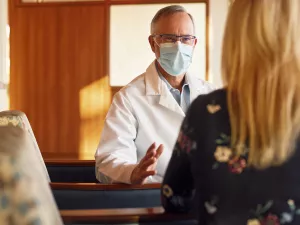Interstitial lung disease can lead to a dry cough and shortness of breath may take a toll on your physical and mental health. We’ll work quickly to find the cause of your condition and determine the best treatment option for you.
What is interstitial lung disease?
There are about 600 million tiny air sacs called alveoli inside your lungs. These air sacs deliver oxygen to the bloodstream when you breathe in, and push out carbon dioxide when you breathe out.
The tissue between the alveoli is called the interstitium, and it gives your lungs structure and support. Think of it like the grout holding tiles in place in home improvement projects. When that tissue becomes irritated, inflamed or thickened, it's known as interstitial lung disease (ILD). It can be caused for a variety of reasons, but a telltale sign of ILD is a dry, hacking cough that just won't go away.
At Tufts Medicine, we're here to help you breathe easy again with comprehensive care for ILDs. While we tailor each person's treatment path to their individual needs, everyone’s care begins with a special biopsy called video-assisted thoracic surgery.

Conditions
There are many different kinds of interstitial lung disease, including:
- Connective tissue disease-associated ILD
- Hypersensitivity pneumonitis
- Idiopathic pulmonary fibrosis
- Sarcoidosis
What causes ILD?
Interstitial lung disease can be triggered by an infection, pollutant, toxin from the environment or an autoimmune disease like:
- Lupus
- Rheumatoid arthritis
- Sjogren’s syndrome
- Systemic sclerosis
The more we know about your unique triggers, the better we can treat your ILD.
Testing
Our radiology team specializes in a minimally invasive lung biopsy called video-assisted thoracic surgery to better understand your ILD. A biopsy involves removing a small piece of tissue from the affected area so that your care team can get a closer look at it in the lab.
After the procedure, you can expect to spend 2 days in the hospital as we keep a close eye on your recovery. Once the tissue analysis is complete, we'll send a report to your rheumatology care team, who will work with you to create a treatment path. This may include antibiotics, steroids or other medications that suppress the immune system and allow your lungs to heal.

From regular office visits to inpatient stays, find the healthcare you need and deserve close to home.

Meet the doctors and care team devoted to supporting you every step of the way along your path to better health.